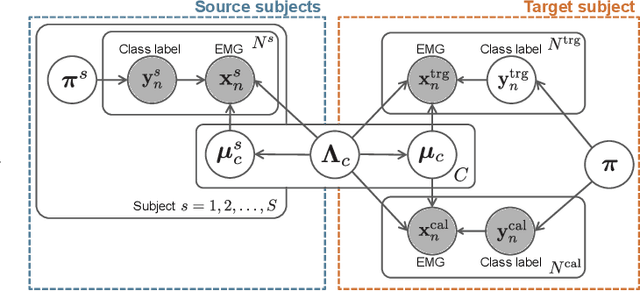Seitaro Yoneda
Recognition of Unseen Combined Motions via Convex Combination-based EMG Pattern Synthesis for Myoelectric Control
May 21, 2025



Abstract:Electromyogram (EMG) signals recorded from the skin surface enable intuitive control of assistive devices such as prosthetic limbs. However, in EMG-based motion recognition, collecting comprehensive training data for all target motions remains challenging, particularly for complex combined motions. This paper proposes a method to efficiently recognize combined motions using synthetic EMG data generated through convex combinations of basic motion patterns. Instead of measuring all possible combined motions, the proposed method utilizes measured basic motion data along with synthetically combined motion data for training. This approach expands the range of recognizable combined motions while minimizing the required training data collection. We evaluated the effectiveness of the proposed method through an upper limb motion classification experiment with eight subjects. The experimental results demonstrated that the proposed method improved the classification accuracy for unseen combined motions by approximately 17%.
Inter-Subject Variance Transfer Learning for EMG Pattern Classification Based on Bayesian Inference
May 21, 2025



Abstract:In electromyogram (EMG)-based motion recognition, a subject-specific classifier is typically trained with sufficient labeled data. However, this process demands extensive data collection over extended periods, burdening the subject. To address this, utilizing information from pre-training on multiple subjects for the training of the target subject could be beneficial. This paper proposes an inter-subject variance transfer learning method based on a Bayesian approach. This method is founded on the simple hypothesis that while the means of EMG features vary greatly across subjects, their variances may exhibit similar patterns. Our approach transfers variance information, acquired through pre-training on multiple source subjects, to a target subject within a Bayesian updating framework, thereby allowing accurate classification using limited target calibration data. A coefficient was also introduced to adjust the amount of information transferred for efficient transfer learning. Experimental evaluations using two EMG datasets demonstrated the effectiveness of our variance transfer strategy and its superiority compared to existing methods.
Bayesian Approach for Adaptive EMG Pattern Classification Via Semi-Supervised Sequential Learning
Sep 30, 2023Abstract:Intuitive human-machine interfaces may be developed using pattern classification to estimate executed human motions from electromyogram (EMG) signals generated during muscle contraction. The continual use of EMG-based interfaces gradually alters signal characteristics owing to electrode shift and muscle fatigue, leading to a gradual decline in classification accuracy. This paper proposes a Bayesian approach for adaptive EMG pattern classification using semi-supervised sequential learning. The proposed method uses a Bayesian classification model based on Gaussian distributions to predict the motion class and estimate its confidence. Pseudo-labels are subsequently assigned to data with high-prediction confidence, and the posterior distributions of the model are sequentially updated within the framework of Bayesian updating, thereby achieving adaptive motion recognition to alterations in signal characteristics over time. Experimental results on six healthy adults demonstrated that the proposed method can suppress the degradation of classification accuracy over time and outperforms conventional methods. These findings demonstrate the validity of the proposed approach and its applicability to practical EMG-based control systems.
 Add to Chrome
Add to Chrome Add to Firefox
Add to Firefox Add to Edge
Add to Edge